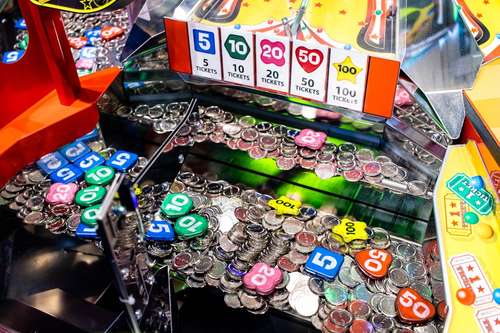Valve has recently found itself in the spotlight, and not for the reasons it would prefer. There’s been a growing controversy as critics and players alike have turned their attention to the gambling mechanics in some of Valve's biggest games. The debate heats up as industry figures, such as Dean Hall, creator of DayZ, argue that these mechanics exploit players without facing enough backlash. It's a hot topic that raises questions about consumer protection, in-game purchases, and digital gambling in the gaming industry.
Every time you load a game, you might wonder if there's a hidden slot machine nestled in its core. Valve has been criticized for adopting monetization strategies that seem to blur the lines between playing a video game and engaging in online gambling. With increasing player concerns about loot boxes and microtransactions, discussions about digital gambling are making headlines. Fans who once admired Valve’s innovation now sit in a mix of bittersweet nostalgia and frustration over modern monetization strategies.
Some gamers feel like they’re being led down a winding road, where every in-game purchase is a gamble. The conversation isn't just about money; it's about ethics, fairness, and whether game developers are putting profits over the player experience. As these issues persist, questions arise: Should game developers be held accountable for encouraging habits that resemble online gambling? And is this practice in line with gaming laws designed to protect consumers?
The Controversy and the Criticism
This section delves into the heart of the controversy, exploring the criticisms that Valve has faced over its gambling mechanics. The recent outcry highlights not only player concerns but also broader ethical implications in game monetization.
The criticism stems from the observation that some of Valve’s games have integrated in-game purchases in a way that mirrors digital gambling. Many feel that these loot boxes and other microtransaction elements are designed to tap into the excitement and unpredictability of gambling, drawing in players with the allure of winning rare items. Some analysts have suggested that the structure of these mechanics creates a risky environment, especially for vulnerable gamers. The discussion is not just academic; it touches real lives by influencing spending habits and contributing to addictive behavior.
Dean Hall's recent commentary has ignited further debates. As someone deeply embedded in game development, his stance on this issue resonates with many implementing similar systems in their projects. He argues that the lack of stringent regulation and the light economic repercussions placed on such practices are concerning. While some companies commit to transparency in their digital gambling mechanics, Valve appears to be criticized for a more ambiguous approach. This has left a significant portion of the community feeling that the accountability for game monetization is severely lacking.
The controversy doesn’t stop at consumer protection; it extends into discussions of gaming ethics and legal issues. In an industry where player trust is paramount, Valve has been put under the microscope for embracing approaches that might treat players more like customers in a casino than consumers in a leisure activity. The debate is further amplified by comparisons to other video game companies who rely heavily on in-game purchases and similar monetization strategies.
Impact on the Gaming Industry
This segment looks at how Valve’s gambling mechanics are influencing the broader gaming industry. The discussion touches on both legacy companies and emerging indie developers, all navigating the fine line between monetization and ethical gameplay.
It's no secret that many game developers look to share Valve's success story when it comes to innovative digital experiences. However, when monetization strategies start to resemble gambling, even the most beloved companies face significant criticism. Players, especially in the United States, are starting to expect transparency and fairness when it comes to in-game purchases. The inclusion of gambling mechanics isn't just an aesthetic choice—it's a business model that carries inherent risks.
Industry insiders worry that this approach could eventually lead to tighter gaming laws and additional consumer protection regulations. Some argue that if game developers like Valve continue on this path, broader legal issues might emerge that could disrupt the entire gaming ecosystem. The gaming community is keeping a close eye on these trends, and many are calling for a sudden change in how in-game monetization is implemented.
From a consumer perspective, game enthusiasts often feel like they are caught in the crossfire of corporate profit goals and player interests. This perception isn’t without merit—loot boxes and microtransactions are designed using psychological triggers that encourage repeated investments in the hope of receiving something valuable. As the watchdogs of the gaming industry push for renewed regulations, Valve's strategies are increasingly under scrutiny from multiple angles.
Potential Solutions and Future Outlook
In this section, we explore potential remedies to the current controversy and the future outlook for game monetization practices. The gaming community and regulatory bodies are working together to identify fair practices that balance profit and players' rights.
The immediate call is for more accountability from game developers. Many believe that Valve and other video game companies must initiate clearer communication with players. This means setting up stricter guidelines around loot boxes, microtransactions, and in-game purchases that mimic gambling. Proactive measures could include transparent odds for rare loot boxes, limiting the amount that players can spend, and stronger age verification processes.
Take, for example, what some consumer protection advocates suggest: implementing mandatory disclosure of odds for every loot box. Players deserve to understand exactly what they're subscribing to. By providing this information upfront, companies can mitigate some of the consumer protection concerns and build trust with their community. In this complex balance between monetization and ethics, the key is to prioritize the player's experience without stifling innovation. This approach might even bring Valve back into favorable light among its most loyal fans.
Looking ahead, it’s clear that the debate over gambling mechanics in video games is far from over. With governing bodies and gaming ethics forums starting to engage with these issues, we may witness tighter restrictions and perhaps even a radical overhaul of game monetization models. For now, the gaming industry stands at a crossroads, with consumer protection and creative freedom fighting for prominence. The regulatory landscape could soon change, making it crucial for companies like Valve to adapt.
It’s a complex game of push and pull—where innovation meets regulation. As players continue to voice their concerns online and through social media platforms, game developers might be compelled to not only rethink their in-game structures but also reassess their commitment to ethical gaming practices. When you’re spending your hard-earned money, it seems only fair to know that every click is a mindful choice, not a hidden gamble.
In conclusion, the recent criticism of Valve for its gambling mechanics in games is an illuminating case that exposes broader issues around digital gambling, in-game purchases, and game monetization strategies. As industry leaders and players alike come together to demand increased accountability, it's clear that the future of gaming must embrace both creativity and consumer protection. This is a wake-up call for all video game companies to truly align their business models with the best interests of the gaming community. If the industry can find that balance, perhaps we can move forward into a new era of ethical and engaging video games—one where risks are minimized and trust is paramount.




